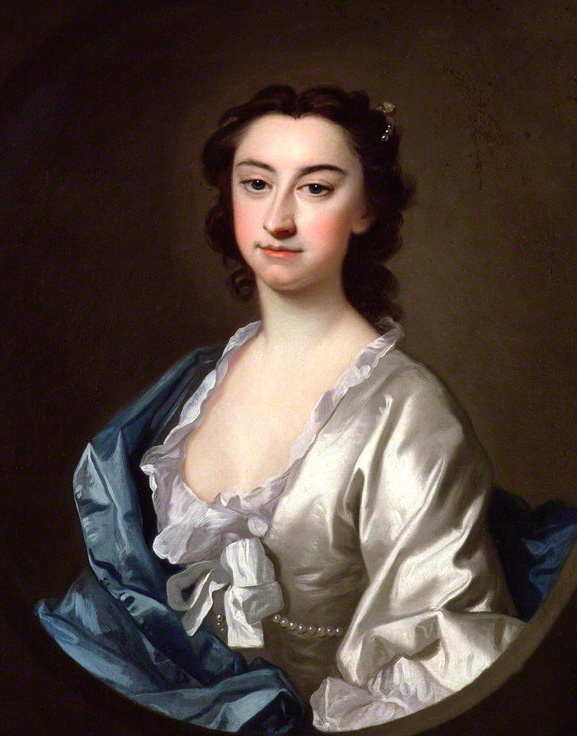
Susannah was born into the musical household of the Arne family in 1714. Actually, the household wasn't that musical at all, Susannah was the daughter of an upholster who was the son of an upholster. Her brother, Thomas, who was four years older than her, had an aptitude for composition and managed to escape the family business when a composer noticed his talent and took him under his wing. Thomas' escape must have inspired both of his siblings, who followed him into the music business. Susannah was noted for her beautiful contralto voice so it was no contest that her brother cast her in his first opera, Rosamund, which debuted her to the London stage in 1733.
Susannah and her voice quickly caught everyone's attention. One person who was especially impressed by the young talent was Handel who wrote in parts in Messiah and Samson especially for Miss Arne. He even took it upon himself to tutor her in music and perfect her voice for her rolls. Since Susannah could not read music, Handel would tirelessly teach her her parts note by note.
In 1734 Susannah married Theophilus Cibber the actor-progeny of theatre big-wig Colley Cibber of Drury Lane. As you may have guessed already, the marriage turned out to be a disaster. Cibber's spend-thrift ways led him to sell some of his wife's possessions in order to settle his debts. Mrs Cibbers was happy with her successful career on stage but her incompetent husband was making her miserable.
In order to relieve some of their debts the Cibbers took on a tenant by the name of William Sloper. However, this did little to lift the escalating debts and Cibber began scheming more ways to acquire money. Sloper not only had to pay rent but also full maintenance for all three of them. It was possibly at this point that Mr Sloper was beginning to look really good to Susannah. Not only was he well-off, he wasn't stealing her clothes and making her miserable. Susannah began a relationship with the tenant which her husband seemed to endorse. That is, until he slapped Sloper with a crim con. (divorce/adultery) lawsuit in 1738. As you can imagine, the trial was the talk of the town. But as the charges were brought forth, evidence also began to appear that was not in Cibber's favour. It seemed as thought the affair may have actually been a ménage à trois between all three parties. In fact, some gossip suggests that Cibber initiated the affair between his wife and tenant by forcing her to sleep with him at gunpoint. The jury was not impressed and awarded Cibber a measly £10 instead of the £5,000 he expected.
 After the trial Susannah ran away with Sloper and the two had a child together. Meanwhile, Cibber was out for blood and filed a counter-suit. This time he was awarded £500 of the £10,000 he expected. His reputation was forever ruined and he later died in a shipwreck on his way to Dublin.
After the trial Susannah ran away with Sloper and the two had a child together. Meanwhile, Cibber was out for blood and filed a counter-suit. This time he was awarded £500 of the £10,000 he expected. His reputation was forever ruined and he later died in a shipwreck on his way to Dublin.Although Susannah's reputation was now tarnished she continued to be successful on stage and still worked with Handel. She lived in Dublin until the gossip died down and then moved back to London to continue with her career on Drury Lane. Here she was able to leave her nasty past behind her and work alongside David Garrick as a tragic actress. When she died in 1766 she was honoured in death by being one of the few actresses to be buried in Westminster Abbey.

once again...2 more great posts!
ReplyDelete"His reputation was forever ruined and he later died in a shipwreck on his way to Dublin."
ReplyDelete...I believe it!!!! *shudders*
Did you notice her in Westminster??? Does one ever tire of going to Westminster? I think 1x a month is appropriate. Again, another fab tart!
To be precise, it isactually Westminster Abbey in London, not Westminster itself where there is also a very big cathedral.
DeleteSeriously I still can't believe I didn't make it back there after saying I had to about a bizjillion times. Now there is so many people to look for there!
ReplyDelete...and thanks Katie!
ReplyDeleteNot to be a chauvanistic pig but...
ReplyDeleteIn the 18th (and before and after) century married women had no personal property, they were the property, like keys to the house.
de Brantigny
They sure were! I have plans for a future post about the crim con divorce trials of the age. That just shows to what degree women were regarded as property!
ReplyDelete